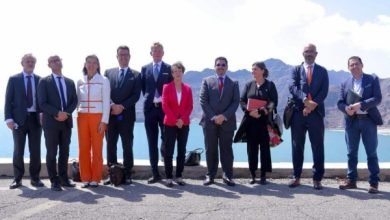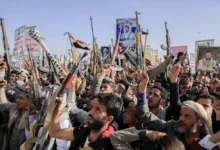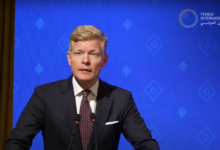Yemen donor conference yields less than half of needed funds

SMA NEWS – Aden
The United Nations chief warned Monday of a “death sentence” for war-torn Yemen as a donor conference yielded less than half the funds needed to prevent a devastating famine.
The UN had appealed for $3.85 billion to fund urgently needed humanitarian programmes, but just $1.7 billion was offered at a virtual pledging conference.
“Millions of Yemeni children, women and men desperately need aid to live. Cutting aid is a death sentence,” UN Secretary-General Antonio Guterres said in a statement.
Describing the outcome as “disappointing”, he said the pledges were less than the UN received in 2020, when donations were first hit by the coronavirus downturn, and a billion dollars less than was pledged in the 2019 appeal.
“The best that can be said about today is that it represents a down payment. I thank those who did pledge generously, and I ask others to consider again what they can do to help stave off the worst famine the world has seen in decades,” Guterres said.
More than 100 governments and donors took part in the conference — co-hosted by Sweden and Switzerland — as Yemen’s Iran-aligned Houthi militias push to seize the government’s last northern stronghold.
Yemen’s six-year-old civil war pits the Iran backed rebels against an internationally recognised government which is supported by a Saudi-led military coalition.
Guterres said the only way of relieving the suffering for Yemeni people was to secure a nationwide ceasefire and a political solution to end a grinding conflict that has plunged the nation into the world’s worst humanitarian crisis.
“There is no other solution,” the UN secretary general said. “The United Nations will continue to stand in solidarity with the starving people of Yemen.”
Jan Egeland, secretary general of the Norwegian Refugee Council, who is on a week-long visit to Yemen, also called the outcome of the conference “disappointing,” warning that the lack of funding would cause massive cuts to Yemen aid. “The shortfall in humanitarian aid will be measured in lives lost,” he said.
From the outset, it was unlikely that donors would meet the UN’s goal given the coronavirus pandemic and its devastating consequences for economies around the globe. Corruption allegations in Yemen aid operations were also a factor.
‘Life-threatening cuts’
Some of the headline pledges on Monday, including $191 million from the United States and Saudi Arabia’s $430 million, were smaller than last year’s donations.
However, Germany offered 200 million euros ($241 million), compared to $138 million last year.
Other major pledges came from the United Arab Emirates ($230 million), the United Kingdom ($123.23 million) and the European Union ( $116.2 million).
Shrinking humanitarian budgets last year forced the closure of many programmes including health services and food distribution, heaping hardship on a country where some two thirds of the population relies on some form of aid to survive.
According to the latest UN data, more than 16 million Yemenis — about half the 29-million population — will face hunger this year.
Nearly 50,000 are already starving to death in famine-like conditions.
The world body has warned that 400,000 Yemeni children under the age of five could die from acute malnutrition.
Houthi spokesman Mohammed Abdul Salam hit out at the pledges, saying that it was a whitewashing attempt for those countries involved in the conflict.
“The conference… does not help Yemen as much as it helps the aggressor nations by giving them the opportunity to cleanse their record and present themselves as donor countries,” he said in a tweet.
However, several speakers at the conference called for the Houthis to stop their offensive on the central province of Marib and their increasing cross-border attacks on Saudi Arabia. “Money is not the only thing Yemenis need. They need an end to attacks on civilians; they need a ceasefire; they need an end to bureaucratic and political blockages on aid flows,” said David Miliband, head of the International Rescue Committee.
Conflict growing ever more complex
The conference comes as the US steps up efforts to revive a peace process under President Joe Biden.
His administration has halted support to the Saudi-led military coalition, while it has reversed a terror blacklisting of the Houthis imposed last month by Donald Trump’s outgoing administration — a designation that many said would have severely impeded aid efforts.
But Houthi militiamen have intensified operations against Saudi Arabia as coalition air strikes pound rebel positions in the north of Yemen, in a bid to stop their campaign to seize the government’s last northern stronghold of Marib.
Saudi Arabia’s civil defense authority said the Houthi projectile landed in a street in the southern province of Jizan Monday, wounding at least five civilians, including three Saudis and two Yemenis, the official news agency reported. The projectile also damaged at least houses and vehicles.
US Secretary of State Antony Blinken on Monday urged the militias to halt the battle for Marib, warning that the nation’s suffering will not stop until a political solution is found.
“The necessary first step is to stop their offensive against Marib, a city where a million internally displaced people live, and to join the Saudis and the government in Yemen in making constructive moves towards peace,” he told the conference.
“We can only end the humanitarian crisis in Yemen by ending the war… so the United States is reinvigorating our diplomatic efforts to end the war,” he said.
“The time is now to make this push to bring about a more stable, prosperous Yemen whose citizens will be able to rebuild their lives and at long last have hope for a better future.”







